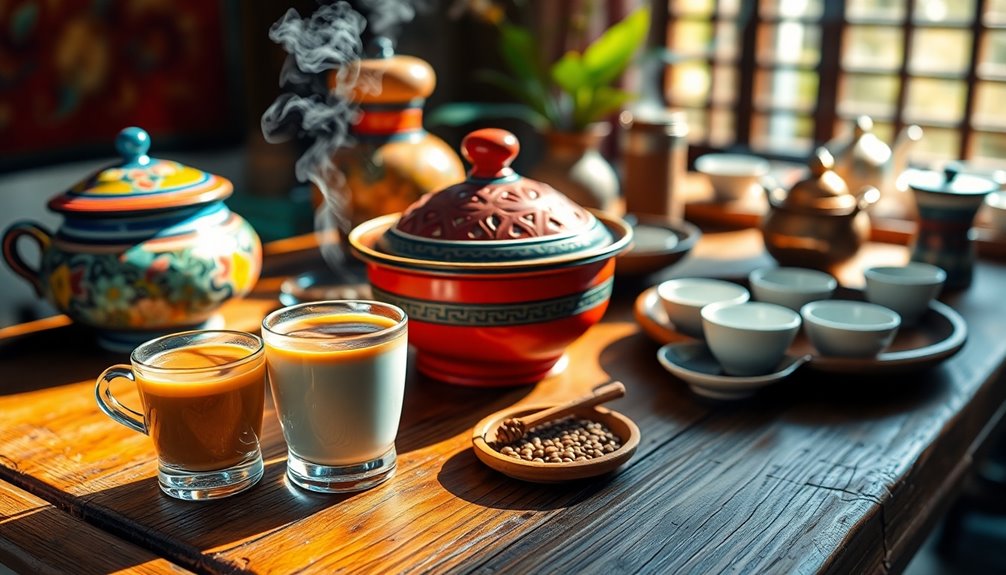Coffee rituals around the world showcase diverse cultural traditions that enhance your experience of this beloved beverage. In Ethiopia, you'll find a community-focused coffee ceremony with roasted beans and spices, while Turkish coffee reading offers insights through grounds left in cups. Brazilian cafezinho fosters friendship, and Vietnamese egg coffee blends tradition with innovation. In Italy, espresso culture thrives as a social hub, while Mexican café de olla honors flavors with spices. Each ritual reflects deep-rooted customs that have evolved, revealing how coffee connects people across cultures. Keep exploring to discover even more intriguing practices centered around this cherished drink.
Key Takeaways
- The Ethiopian Coffee Ceremony emphasizes community bonding through a three-round serving, enhancing social interactions and hospitality with spices like cardamom and cinnamon.
- Turkish Coffee Reading, recognized by UNESCO, combines coffee brewing with tasseography, offering insights into character and future predictions, enriching social gatherings.
- Brazilian Cafezinho serves strong, sweet coffee in small cups, symbolizing friendship and hospitality, and is integral to daily social interactions.
- Vietnamese Egg Coffee uniquely blends strong coffee with whipped egg yolks, showcasing innovation and adaptability in Vietnam's coffee culture.
- Italian espresso culture fosters quick social interactions at bars, emphasizing the ritual of enjoying coffee after meals for better digestion.
Ethiopian Coffee Ceremony
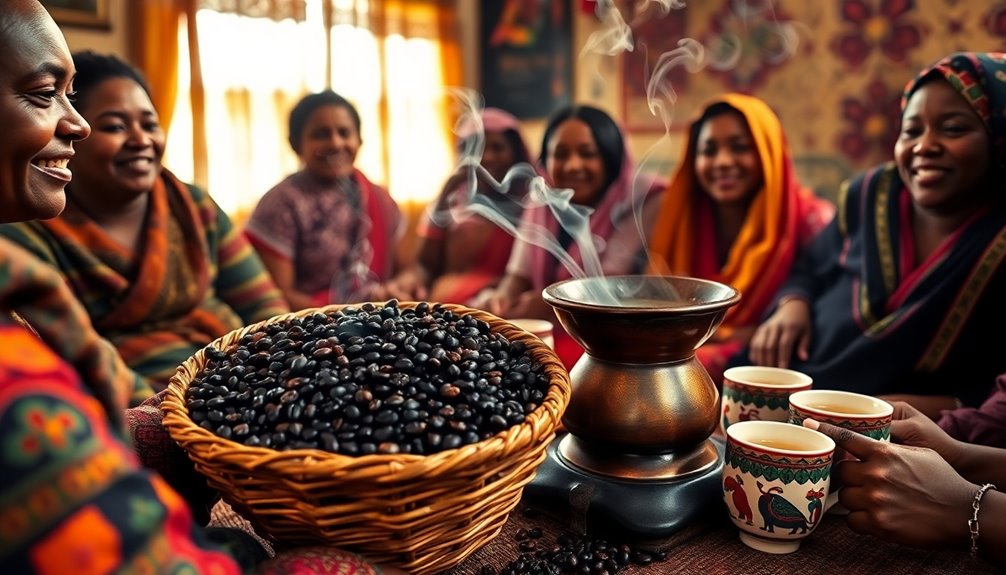
When you experience an Ethiopian coffee ceremony, you immerse yourself in a rich social ritual that celebrates community and connection.
This lengthy tradition emphasizes hospitality and cultural heritage, often unfolding in social hubs where friends and family gather.
The brewing process begins with roasting coffee beans in a clay pot called a jebena, filling the air with an aromatic experience.
As the coffee is ground and prepared, spices like cardamom and cinnamon may be added, enhancing the flavor.
You'll enjoy the coffee in three rounds—abol, tona, and baraka—each encouraging conversation and representing a transformation of spirit.
This ceremony is more than just coffee; it's a vibrant expression of community bonding and shared experiences.
Turkish Coffee Reading
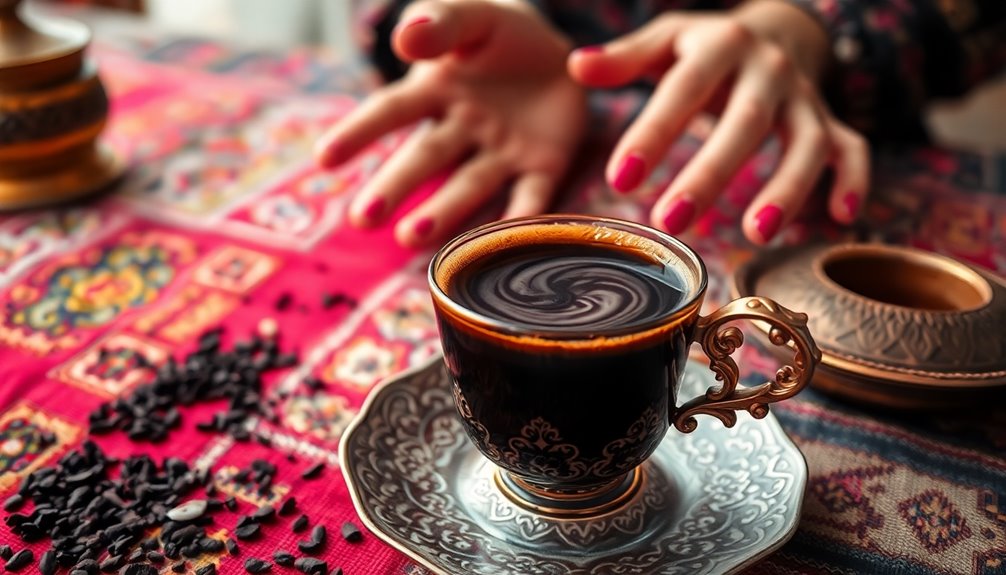
Turkish coffee reading, also known as tasseography, offers a unique glimpse into the future through the remnants of your coffee cup.
After brewing your rich Turkish coffee in a cezve, you enjoy its unfiltered strength, leaving behind coffee grounds. Once finished, you invert the cup onto a saucer, letting the grounds settle.
A reader then analyzes the patterns, revealing insights about your future and character, with symbols like rings for love and snakes for jealousy.
This practice is more than just a pastime; it embodies cultural significance and hospitality, often enjoyed during gatherings as a social activity.
Recognized by UNESCO as part of Intangible Cultural Heritage, Turkish coffee reading fosters community and connection among friends and family.
Italian Espresso Culture
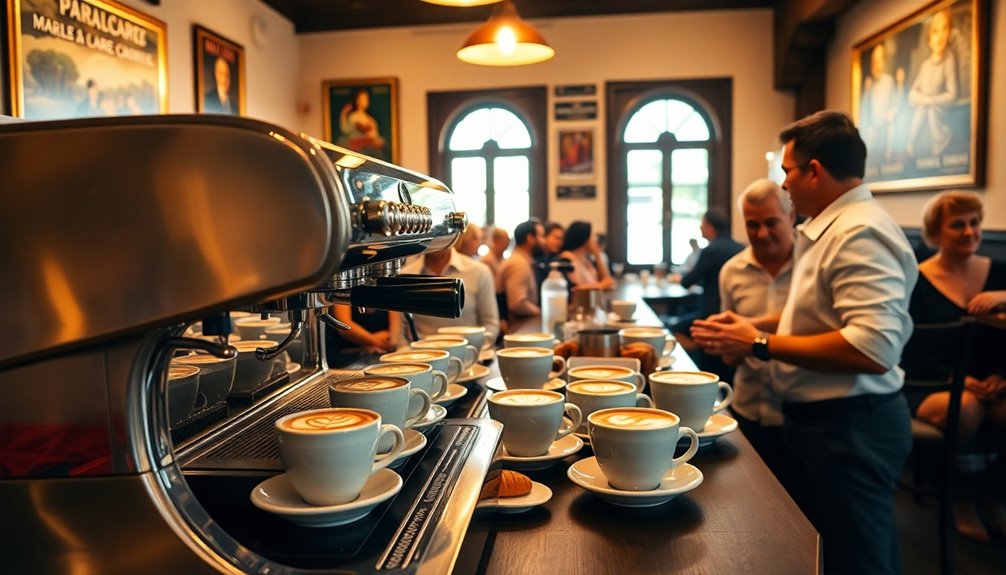
Although it might seem simple, Italian espresso culture is rich with tradition and social significance.
In Italy, espresso is brewed as a concentrated shot, served quickly, often while standing at the bar. This practice encourages social interactions with baristas and fellow patrons, making it a vibrant part of daily life.
The emphasis on simplicity and speed is evident, as milky drinks like cappuccino are typically reserved for breakfast. Italians enjoy their espresso after meals, believing heavy coffee can hinder digestion.
This unique approach not only reflects their coffee culture but also showcases a commitment to quality and craftsmanship. The importance of espresso shots in Italian rituals is a testament to the country's dedication to coffee excellence.
Since the 19th century, espresso bars have become social hubs, influencing coffee rituals around the globe.
Vietnamese Egg Coffee

From the robust espresso culture of Italy, we move to a unique treat that captures the creativity of Vietnamese coffee traditions: Egg Coffee, or "cà phê trứng."
This delightful concoction combines strong brewed coffee with whipped egg yolks, sugar, and sweetened condensed milk, resulting in a frothy, rich beverage that stands out in the global coffee scene.
Originating in the 1940s in Hanoi, it emerged as a substitute for scarce fresh milk.
You’ll find it served hot in winter or cold over ice in summer, making it a versatile treat enjoyed year-round. The rich, creamy texture of a latte pairs perfectly with the bold flavor of espresso, creating a decadent and indulgent beverage. The iced latte flavor description includes a smooth blend of espresso and milk, with hints of sweetness and a refreshing, slightly bitter finish. Whether enjoyed in the cozy warmth of a café or sipped leisurely on a sunny patio, the iced latte is a beloved choice for coffee enthusiasts of all tastes and preferences.
This innovative drink showcases the adaptability of Vietnamese coffee culture, blending traditional ingredients with modern techniques for a truly unique flavor experience. The drink incorporates rich, aromatic beans sourced from local farms, ensuring that every sip pays homage to its origins. By infusing it with a hint of creamy coconut and a touch of sweet condensed milk, this innovative concoction elevates the experience beyond a typical coffee. The result is a bold mokka coffee flavor profile that tantalizes the taste buds, leaving a lasting impression of both tradition and innovation.
Brazilian Cafezinho Ritual
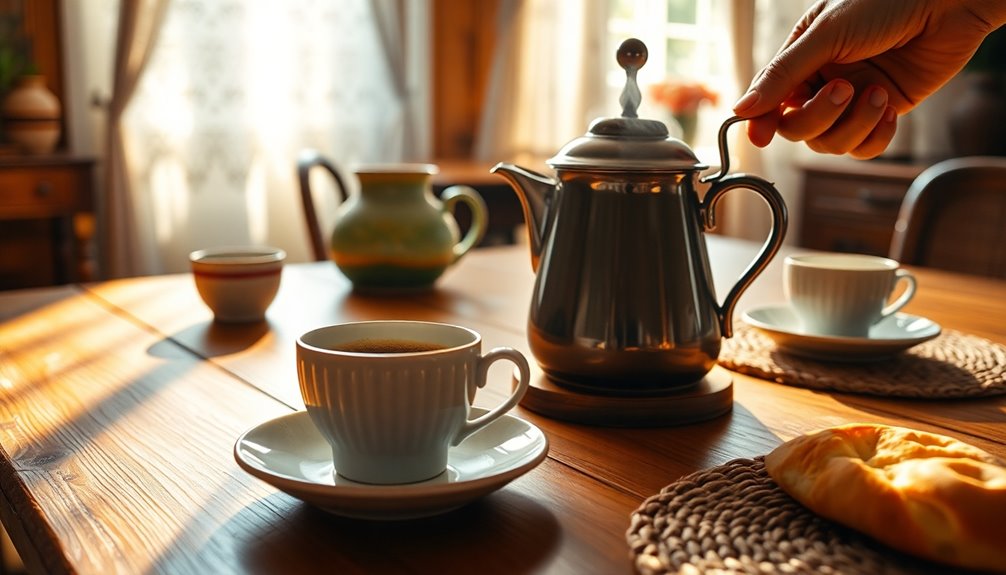
When you step into a Brazilian home, you might be greeted with a warm smile and the rich aroma of cafezinho wafting through the air. This small, strong coffee, brewed with finely ground coffee and sugar, embodies Brazilian culture and hospitality.
Typically served in small cups, cafezinho plays an essential role in daily life, encouraging social interactions and fostering community. You'll often find it accompanying meals or enjoyed as a post-meal treat, inviting conversation and connection among friends and family.
The ritual of offering cafezinho isn't just about coffee; it's a heartfelt gesture of friendship that reflects the warmth and conviviality ingrained in Brazilian society. Interestingly, this beloved beverage is rich in antioxidants, which may contribute to overall health benefits. So, savor each sip and relish the bonds it creates.
Middle Eastern Cardamom Coffee

When you explore Middle Eastern cardamom coffee, you'll discover its rich historical significance and the unique brewing techniques that make it special.
This aromatic beverage not only enhances your coffee experience but also connects you to the traditions of hospitality in the region.
Let's take a closer look at how cardamom transforms this beloved drink and the rituals that surround its preparation.
Historical Significance of Cardamom
Although cardamom has been used in coffee for centuries, its significance in Middle Eastern culture goes far beyond flavor. When you sip on this spiced coffee, you're participating in a tradition that emphasizes hospitality and community.
Imagine the scene:
- The rich aroma of freshly ground cardamom wafts through the air.
- Delicate cups filled with warm, inviting coffee are passed around.
- Laughter and stories flow as friends and family gather.
- Each serving is a sign of respect, reinforcing bonds.
Cardamom, often called the "Queen of Spices," enhances the coffee's flavor, balancing bitterness and warmth.
In the Middle East, these coffee rituals serve as a cultural connector, celebrating craftsmanship through meticulous brewing methods and shared experiences.
Brewing Techniques and Rituals
To brew authentic Middle Eastern cardamom coffee, you'll need a few key ingredients and tools, starting with finely ground coffee beans and crushed cardamom pods.
Using a small pot called a cezve, combine water, coffee, and cardamom, then bring it to a gentle boil. As the coffee is brewed, the rich aroma fills the air, creating a sensory experience that embodies the warmth and hospitality of the culture.
Traditionally served in small cups filled only one-third full, this encourages polite sipping and conversation. Coffee rituals often include dates or sweets, balancing the bitterness and enhancing the overall experience.
This unique preparation not only satisfies your taste buds but also connects you to the rich traditions of the Middle East.
Mexican Café De Olla
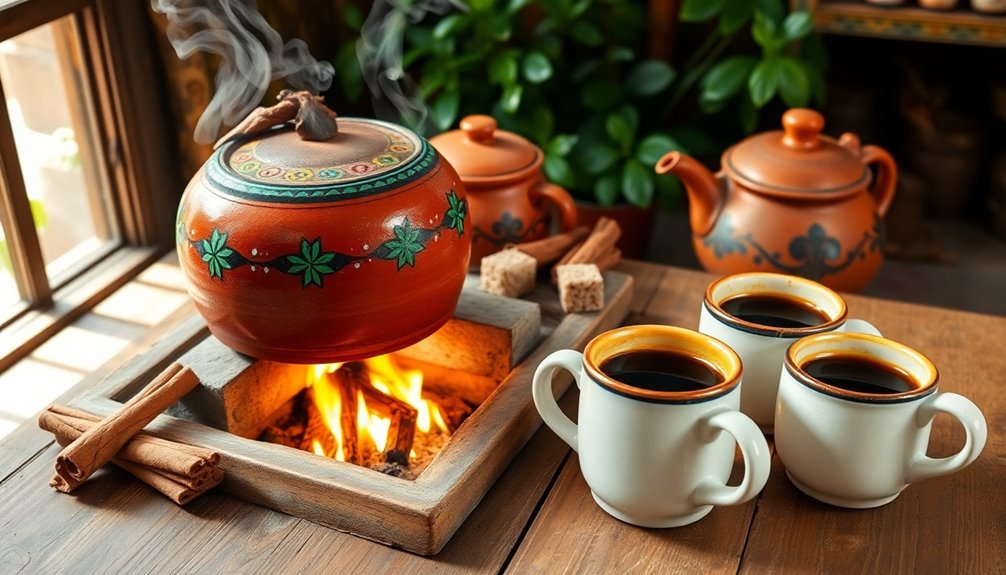
Café de olla, a beloved traditional Mexican coffee, brings together rich flavors and cultural significance in every sip. The brewing process involves simmering coffee with spices and sweeteners in earthenware pots, creating a warm atmosphere that invites social interaction.
It's not just a drink; it's an experience meant for sharing. Picture yourself enjoying café de olla with friends and family, surrounded by:
- The comforting aroma of cinnamon wafting through the air
- The deep, rich tones of piloncillo blending harmoniously
- Rustic clay mugs brimming with warmth
- Laughter and stories exchanged over steaming cups
This delightful beverage has roots in the Mexican Revolution and remains a staple for fostering community bonds, especially in colder regions. Drinking café de olla can also evoke feelings of emotional regulation, providing comfort and stability during moments of stress.
Irish Coffee Traditions
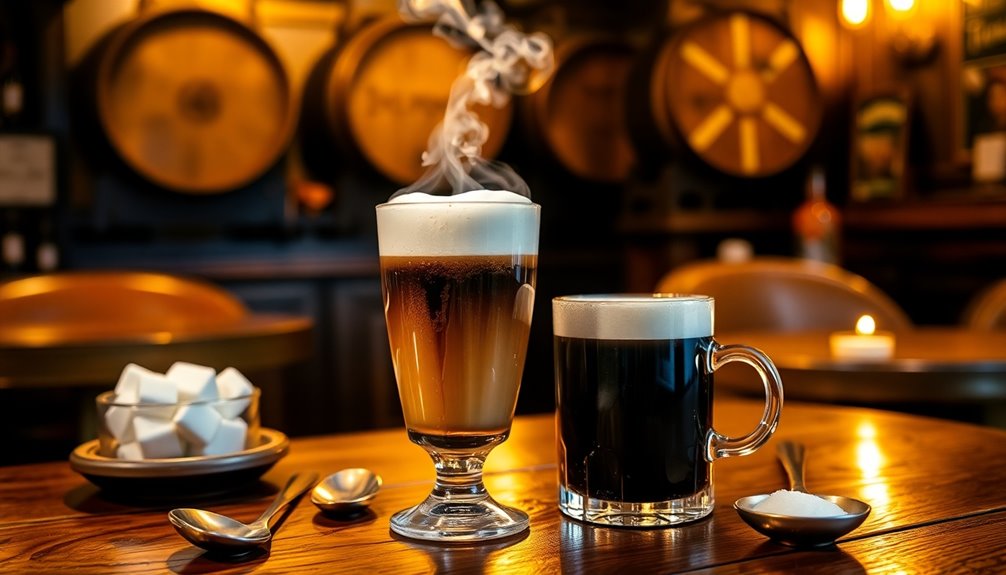
When you think of Irish coffee, you're not just enjoying a drink; you're tapping into a rich history that dates back to the 1940s.
The preparation of this warming beverage, with its unique blend of coffee, Irish whiskey, and whipped cream, has become a cherished tradition.
Plus, today's local cafés serve as vibrant gathering spaces, continuing the legacy of Ireland's coffee culture.
Historical Significance of Coffee
Although Irish coffee is often seen as a modern comfort drink, its historical roots run deep, reflecting a rich tapestry of cultural influences. This beloved beverage emerged in the 1940s, designed to warm weary travelers returning from Newfoundland.
The drink thrives in Ireland's evolving coffee culture, where traditional tea has made way for a vibrant coffee scene.
Picture the ambiance:
- Cozy pubs filled with laughter
- Friends enjoying coffee breaks together
- Whipped cream topping the steaming Irish coffee
- Baristas crafting each cup with care
This beverage is more than just a drink; it's an integral part of daily life, fostering social interactions.
Today, coffee shops often serve Irish coffee, merging old traditions with modern tastes, deeply rooted in Irish hospitality.
Preparation Techniques and Ingredients
To create a perfect Irish coffee, you'll need to focus on a few key ingredients and techniques that elevate this classic drink.
Start with a rich coffee brewed using your preferred method, ensuring it's hot and fresh. Combine the black coffee with Irish whiskey and brown sugar, stirring until the sugar dissolves completely. This attention to detail enhances the coffee experience, offering a slightly caramelized flavor.
To finish, carefully layer thick whipped cream on top, allowing it to float and create that signature look. Serve your Irish coffee in a glass to showcase the layers, and enjoy each sip as the warmth envelops you.
This delightful beverage not only warms the body but also celebrates a rich tradition.
Social Gathering Spaces Today
As Irish coffee continues to gain popularity, coffee shops across Ireland have transformed into vibrant social gathering spaces.
These modern cafés blend traditional coffee practices with contemporary tastes, creating a lively atmosphere for communal experiences. You might find:
- Locals chatting over steaming cups, savoring the fusion of flavors.
- Musicians strumming tunes that fill the air with warmth.
- Baristas crafting Irish coffee, a drink rich in history and taste.
- Friends gathering to celebrate milestones or simply unwind.
This evolution reflects a growing coffee culture, reminiscent of the coffee ceremonies of Ethiopia, where every sip fosters connection.
Today's coffee houses serve not just beverages, but also a vibrant tapestry of community life, drawing people together in shared moments of joy.
The Role of Spices

Spices play an essential role in shaping coffee rituals around the world, enhancing flavors and deepening cultural significance.
In Middle Eastern traditions, adding cardamom to coffee symbolizes hospitality, fostering community during social gatherings. Similarly, Mexican Café de Olla infuses spices like cinnamon, reflecting cultural history from the Mexican Revolution. This blend of flavors can also enhance vibrational energy, contributing to a more enjoyable and fulfilling experience. The addition of spices can also be seen in the preparation of an Americano coffee, where the strong coffee taste is often complemented by flavored syrups or spices.
In Saudi Arabia, the unique blend of coffee brewed with cardamom and saffron underscores its ceremonial nature. The practice of spicing coffee emphasizes the connections and shared experiences within various cultures.
These spices transform a simple cup of coffee into a rich cultural ritual, showcasing local customs and the social importance of coffee consumption.
Through these traditions, you can savor not just the beverage but the entire experience. The deep-rooted father-daughter bond can similarly enrich social gatherings, illustrating how relationships enhance cultural rituals.
Evolving Coffee Customs

While traditional coffee customs have deep roots in cultural history, they're evolving to meet the demands of modern life. You'll notice how these changes reflect a blend of heritage and contemporary lifestyles.
- Ethiopian coffee ceremonies now embrace urban settings, enhancing accessibility.
- Italian espresso culture clings to its strict customs, valuing quality in a fast-paced world.
- Swedish Fika highlights the need for social connections, encouraging breaks for coffee and conversation.
- Online resources help preserve traditional coffee practices, ensuring they adapt to today's context.
These evolving coffee customs not only honor coffee producers but also strengthen community gatherings, making coffee rituals more relevant and enriching in our daily lives.
Frequently Asked Questions
What Are Some of the Rituals or Traditions Associated With Coffee?
When you think about coffee rituals, you might imagine the communal experience of brewing and sharing coffee with friends.
In Ethiopia, you roast the beans, grind them, and serve them in a special pot, creating a warm atmosphere.
In Turkey, you might enjoy unfiltered coffee while engaging in fortune-telling.
In Sweden, you take a break for Fika, savoring coffee with pastries.
Each tradition emphasizes connection, making your coffee experience richer and more meaningful.
How Does Coffee Culture Vary Around the World?
Coffee culture varies widely around the world, reflecting local traditions and social norms.
In Ethiopia, you'd participate in a communal coffee ceremony, while in Italy, you'd enjoy a quick espresso at a bar.
If you're in Vietnam, you might savor egg coffee, blending sweet and creamy flavors.
Each country offers unique rituals that highlight coffee's role in connection, hospitality, and daily life, making every coffee experience a cultural journey.
Why Is Coffee so Beloved?
Coffee's beloved status comes from its rich flavors and the comfort it provides.
You enjoy its ability to boost your energy and enhance focus, making it an essential part of your daily routine.
The warmth of a freshly brewed cup often sparks moments of connection with friends and family.
Each sip offers a unique experience, reflecting diverse brewing methods and cultural traditions, which makes coffee not just a beverage, but a cherished ritual in your life.
What Is the Cultural Relevance of Coffee?
You might think coffee's just a morning jolt, but it's practically a cultural celebrity!
It's woven into our social fabric, fostering connections and sparking conversations. In Ethiopia, it's a ceremonial affair; in Italy, it's all about that quick espresso at the bar.
Whether you're sipping in Sweden during Fika or indulging in Turkish fortune-telling, coffee's relevance goes beyond caffeine.
It's a delightful excuse to gather, relax, and enjoy life's little moments together!
Conclusion
As you sip your next cup of coffee, imagine the rich aromas wafting through a bustling Ethiopian market or the delicate ritual of Turkish coffee reading unfolding before you. Picture the vibrant streets of Vietnam, where creamy egg coffee delights your senses. Each brew tells a story, steeped in tradition and culture. With every sip, you're not just enjoying a beverage; you're partaking in a global tapestry, woven together by love, history, and the warmth of shared moments.
